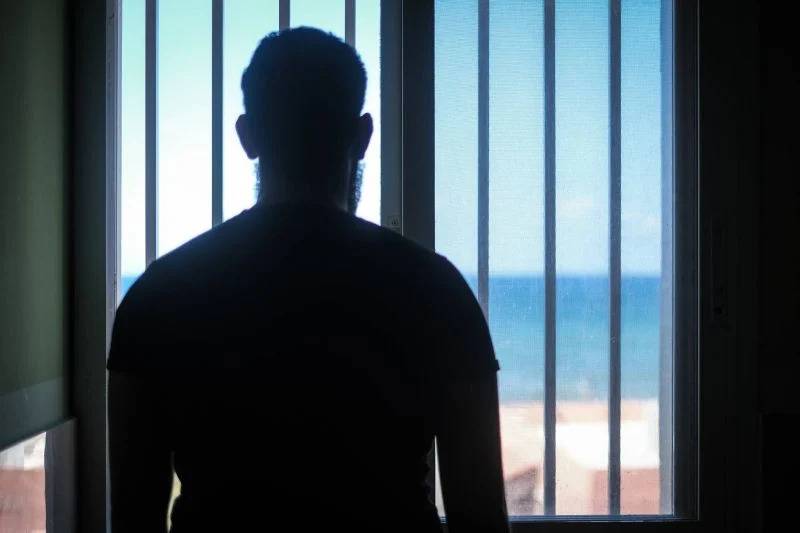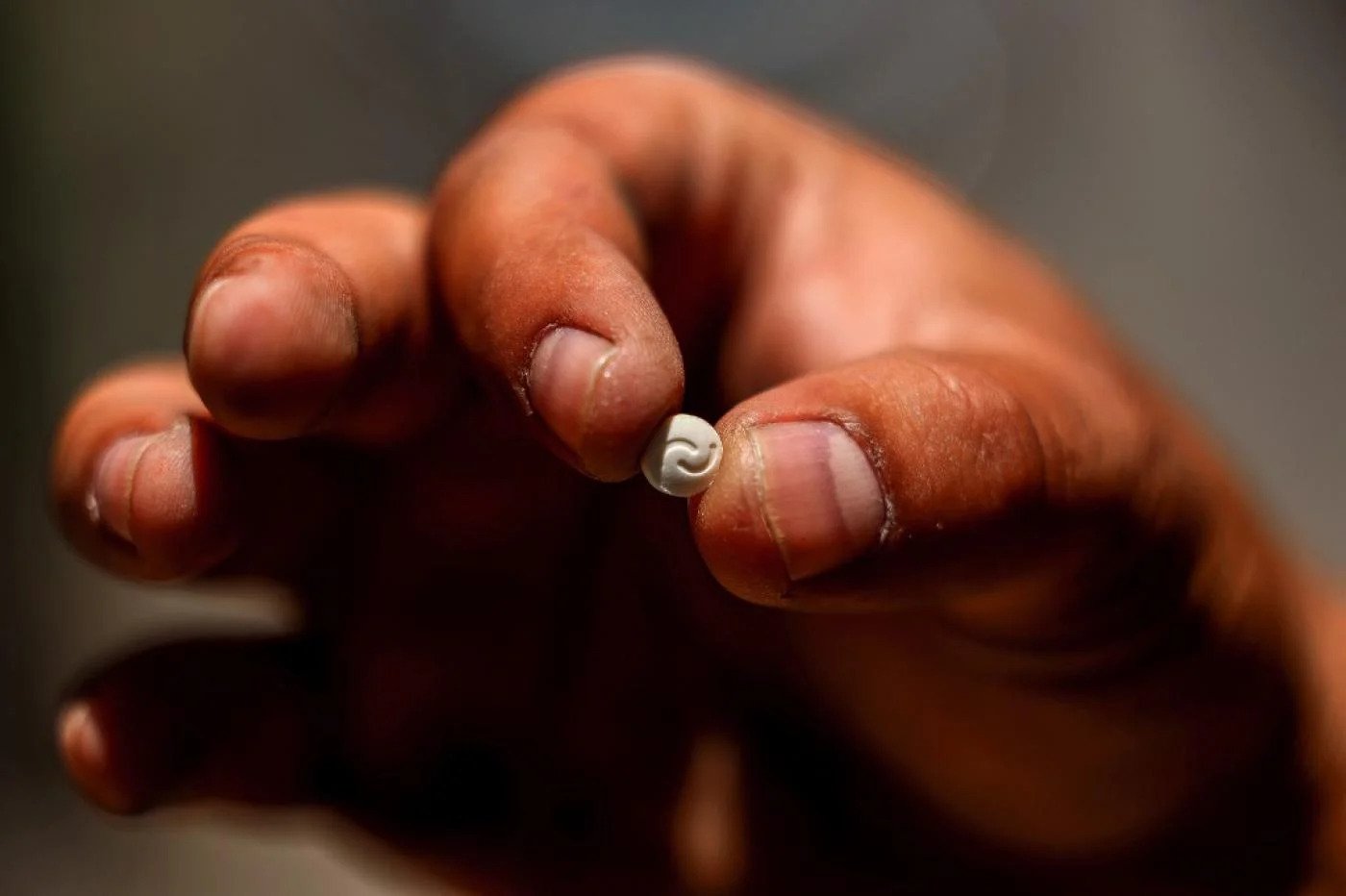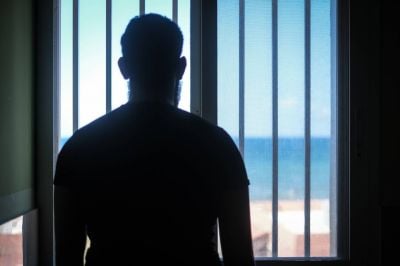
Samer*, 27, looks out at the sea from his room at the Fakih Hospital's addiction treatment center in Sarafand. (Credit: João Sousa/L'Orient-Le Jour)
Patients, looking haggard, come out of their rooms in bathrobes. Some enjoy a smoke break in the corridors, lit up like an operating room.
A single locked door separates the mental health and detox units at the private Fakih Hospital in Sarafand, where people struggling with drug addiction receive treatment to become sober.
Samer* was dragged by his family to this hospital “so that I don’t hurt anyone,” he says, with a shaking voice.
Through the bars of his room, which costs him about $100 in cash per night, the 27-year-old looks out over the sea. It’s been almost a week since he was admitted for Captagon addiction treatment.
Taking four to five pills a day, Samer ended up haunted by hallucinations and became more “aggressive, violent and paranoid” as the months went by, imagining in particular that his family was against him. One night, he even tried to jump off the balcony.
“I thought someone was trying to hurt me,” says Samer, who started using drugs at the age of 15. “I had [a feeling of] emptiness that I wanted to fill,” he says. Drugs became the “only solution.”
Dark and hollow face, sunken eyes, skin on bones, Samer arrived at the hospital in the middle of a psychotic episode. For five days, he had neither eaten or slept because of the Captagon’s effects. “I tried to stab my uncle,” he says, eyes on the ground.
In Lebanon, people addicted to Captagon are far from the norm among patients at similar treatment centers, as the drug is still largely considered an export product, especially to the Gulf countries.
“Compared to other drugs, Captagon use in society is not yet a major problem. In Lebanon, the issues are more about its production and smuggling,” said Tatyana Sleiman, executive director at Skoun, an NGO that has opened addiction centers in Lebanon.
Captagon abuse is more frequent in areas bordering Syria, explained Dr. Ramzi Haddad, a psychiatrist and co-founder of Skoun.
“It is especially present in the areas where it is produced,” added Dr. Kassem Hijazi, head of the psychiatry department at Fakih Hospital, and an addiction specialist.
Working more, shooting up more
While it is more common in some areas, Captagon is also more popular among some groups, including “the land workers, because they become more productive and work more,” said Lina el-Khoury, who works at Oum El Nour, an NGO that helps users overcome their addiction.
The drug became attractive to Jad, who was forced to stand on his legs for 13 hours straight working night shifts in a Beirut restaurant. The 27-year-old used Captagon for the first time in 2016, after a colleague told him about a seemingly magic pill that would give him energy for a whole day.
He started with one pill a day. Then two. “With Captagon, I feel invincible: It is as if I could do anything, and nothing affected me mentally. I took it because it was stronger than all the others,” he said.
“Today we don’t know exactly what it is. What we are almost sure of is that it is an amphetamine or amphetamine-like,” explained Dr. Haddad.
Only the producers know Captagon’s actual composition, said Dr. Hijazi. “It could be blended with caffeine, paracetamol … or even other drugs, which makes it even more dangerous,” he added.
 A Captagon pill stamped with two crescent moon shaps (a reference to the original, legal form of the drug). (Credit: Joseph Eid/AFP)
A Captagon pill stamped with two crescent moon shaps (a reference to the original, legal form of the drug). (Credit: Joseph Eid/AFP)
Captagon, like amphetamines, stimulates three neurotransmitters — dopamine, serotonin and norepinephrine — that affect pleasure and mood, stimulate alertness and excitement, among other things.
“An increase in energy, decrease in the need for sleep and appetite. The user feels stronger and has a sense of euphoria,” explained Dr. Haddad.
Over the years, Jad became a shadow of his former self. His dark under-eye circles paled his face, his eyes became red, his teeth were damaged, his body thinned out. “My heart beats did not stop accelerating,” said the young man, who decided to stop using Captagon in 2020.
“Now I just use the ‘shit,’” meaning hashish, says Jad. Captagon can cause health complications, especially to the cardiovascular system, said Dr. Haddad.
“It can also cause delirium and hallucinations,” added Dr. Hijazi, which are the “most dangerous” complication. “The user can become violent towards those around him or her and even harm themselves,” he continued.
While Jad said he used this drug only for his work purposes, others have used it for pleasure.
The ‘poor man’s’ cocaine
Past the door, the hashish smells strongly. The smoke soaks this room, whose walls are faded. Pills of all kinds are scattered on the coffee table, including Captagon.
“This one is call the ‘camel,’ it’s one of the most powerful pills,” explains Jean* who was dismissed from the army for drug use. The young man, in his 20s, prefers heroin but uses Captagon occasionally.
Jean takes a pill out of a bag filled with tablets, where two crescent moons face each other, in reference to the original design of Captagon when it was a legal drug, and swallows it.
“We can talk now,” he says, sitting on his sofa bed with his dealer and a friend. He fell into Captagon when he was 18. His friend takes one too: it’s his first time. He laughs nervously.
Discussion comes from all sides: problems at work or with someone’s girlfriend, politics ... It’s hard to follow them.
“It’s like you have ‘a boost’ in your head and in your body. I have more energy, I become talkative,” says Jean. But once the drug gets out of his system, he can’t stand it. “It’s as if your body broke down.”
In a bid to mask this after-effect, Samer, the hospital patient, increased his dosage. “As soon as I woke up, I took it on an empty stomach to help me stand on my feet. I was anxious all the time,” he says in his room at Fakih Hospital.
Samer started using illegal drugs as a teenager, first hashish, then tramadol, then crack. He eventually turned to Captagon because of the rising price of the crack due to the economic crisis.
“It’s the easiest to find, and it’s cheap,” he says.
Cheap and easy to access, this so-called “poor man’s cocaine,” helps out in these times of hyperinflation. As the local currency plummeted, he could no longer afford the millions of Lebanese lira that the crack doses cost, and turned instead to Captagon.
“I only had to pay LL100,000,” he says.
“Since the crisis began, more and more patients have been admitted for using Captagon,” according to Dr. Hijazi.
Before the crisis, Jean used to pay LL500 [$0.33 at the time] per Captagon pill. Now “it’s not more than LL20,000,” about $0.55 cents at the parallel market rate, he says.
It is a relatively modest price increase in a country where the prices of some products, starting with food items, have sometimes been multiplied by four.
Consumers sometimes even get a discount from dealers if they take several pills. This fuels fears that the market will evolve in a similar way to that in the Gulf. In general, the drugs “cost less than a bread bundle,” says Jean, bare-chested and skeletal.
*The names of current and former Captagon users quoted in this report have been changed to protect their identities.
This article was originally published in French in L’Orient-Le Jour. Translation by Joelle El Khoury.
